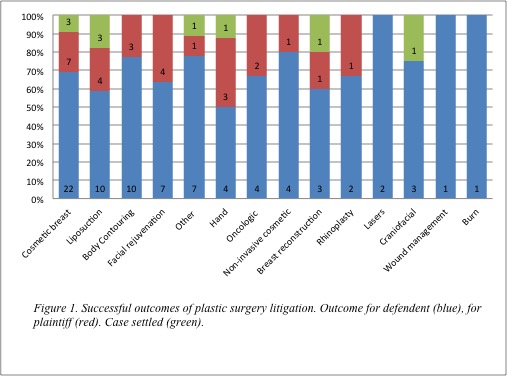Back to 2015 Annual Meeting
An Analysis of Malpractice Litigation and Expert Witnesses in Plastic Surgery
Paul J. Therattil, M.D., Stella Chung, B.A., Aditya Sood, M.D., M.B.A., Mark S. Granick, M.D., Edward S. Lee, M.D..
Rutgers New Jersey Medical School, Newark, NJ, USA.
BACKGROUND:
The rate of malpractice litigation continues to increase yearly. Expert witness testimony is crucial for juror decision-making, but is not necessarily free of bias. The goals of this study were to examine the trends in malpractice litigation in plastic surgery, as well as to examine the characteristics of expert witnesses in plastic surgery litigation.
METHODS:
The Westlaw legal database was queried for jury verdict and settlement reports related to plastic surgery from 2009-2014. Cases included for analysis were examined for expert witness testimony, procedure performed, alleged injury, cause of action, verdict, and indemnity payments. Characteristics of the expert witnesses were also analyzed.
RESULTS:
Of 93 relevant cases, 65.5% resulted in favor of the defendant, 23.7% in favor of the plaintiff, and 10.8% in settlement. Mean plaintiff award was \,036,469 while mean settlement was \,960. The most commonly litigated procedures involved breast surgery (34.4%), liposuction (18.3%), and body contouring (14.0%). The most common claims were for disfigurement (52.7%), or physical injury (39.8%). The most common cause of action claimed was negligence (50.5%), lack of informed consent (30.1%), and failure to diagnose or treat injury (30.1%). Of 139 expert witnesses, 50% were plastic surgeons. The party of a lawsuit was more likely to win the case if its expert witness was a plastic surgeon (p < 0.05). Defendant expert witnesses were more academically productive that plaintiff expert witnesses (7.83 ± 1.50 vs. 4.12 ± 1.10) (p < 0.05), but rate of board certification and presence in full-time academia were not significantly different.
CONCLUSIONS:
Plastic surgery litigation tends to favor defendants. Most litigation involves breast surgery, liposuction, and body contouring. Plastic surgeons should be careful in providing informed consent, as the purported cause of action in nearly one-third of litigation. Parties with a plastic surgeon as an expert witness tend to be more successful in litigation.

Back to 2015 Annual Meeting
|




